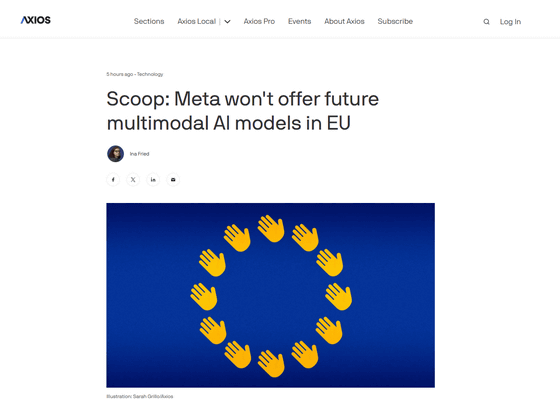Meta announces it will not offer its Llama-based multimodal AI to the EU

The EU has imposed strict regulations on major digital platforms and their operating companies under the Digital Markets Act and the Digital Services Act , and big tech companies such as Apple, Google, Meta, and Microsoft are scrambling to comply with the law. Meta, which develops the large-scale language model Llama, has announced that it will not offer its multimodal AI, which was scheduled to be released in 2024, in the EU.
Meta won't bring future multimodal AI models to EU
https://www.axios.com/2024/07/17/meta-future-multimodal-ai-models-eu

According to overseas news media Axios, Meta plans to release a multimodal AI capable of inferring video, audio, images, and text based on its in-house developed large-scale language model, Llama, in 2024. This multimodal AI will be incorporated into a wide range of products, including smartphone apps and smart sunglasses such as Ray-Ban Meta .
Meta told Axios in a statement that it plans to release a Llama-based multimodal AI in the coming months, but will not release it in the EU due to the unpredictability of the EU's regulatory situation. The multimodal AI will be released under an open license, but the models will not be available for use in the EU.
Meta's decision not to provide its open source multimodal AI to the EU may also mean that products and services that use it will not be available in the EU. Meta has said that it plans to offer a larger version of Llama 3 that only supports text for EU customers and businesses.
The EU has decided to impose an AI law regulating AI on August 1, 2024. Under the AI law, companies that violate the law will be fined up to 35 million euros (approximately 6 billion yen) or 7% of their annual global turnover, meaning that Big Tech companies developing AI will be subject to stricter regulations than ever before. Meta's multimodal AI will also be subject to this AI law if it is released in the EU.
EU's 'AI Law' to come into force on August 1, 2024, fines for violations will be up to 7% of annual turnover or 35 million euros - GIGAZINE

However, Axios believes that Meta is not avoiding AI law restrictions, but rather that regulators have stepped in despite the company using customer data to train its AI in accordance with the EU General Data Protection Regulation (GDPR).
Meta announced in May 2024 that it would use posts published on Facebook and Instagram to train its AI. At that time, Meta notified EU users that 'AI training is opt-out and users can refuse, and training will begin in June 2024.' In addition, Meta said that it had reported its training and notification to EU regulators in advance, and that there was no particular complaint.
However, after notifying users, in June 2024, EU regulators told Meta to temporarily suspend training of its AI.
Meta to suspend plans to enhance AI in Facebook and Instagram posts in EU - GIGAZINE

A Meta spokesperson said, 'EU regulators have been much slower interpreting existing laws than regulators elsewhere,' implying that the EU may not be enforcing its laws adequately.
Apple has also announced that it will not offer new AI-related features, including Apple Intelligence, in the EU. Regarding the reason for canceling the offer in the EU, Apple said, 'We are concerned that the interoperability requirements of the Digital Markets Act could force us to compromise the integrity of our products in ways that put users' privacy and data security at risk.'
'Apple Intelligence' and 'iPhone Mirroring' announced by Apple at WWDC24 will not be released in the EU in 2024 - GIGAZINE

Related Posts:
in Software, Web Service, Posted by log1i_yk





